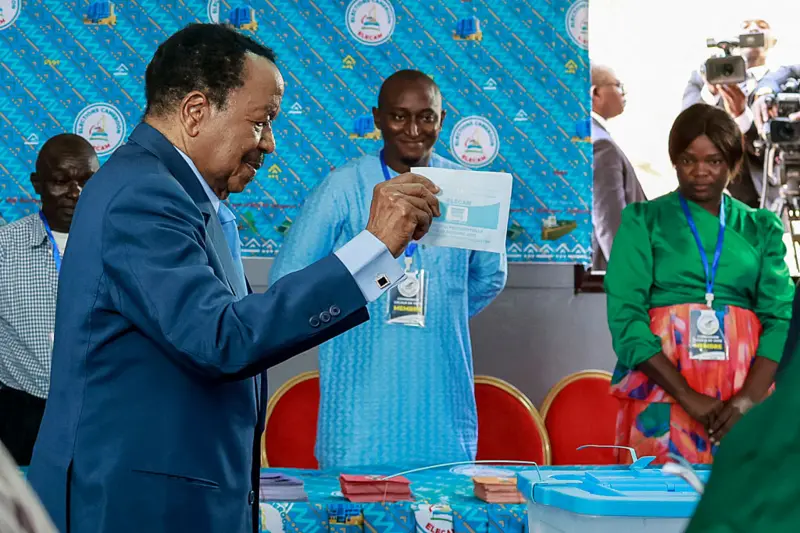- Safiu Kehinde
The 92-year-old Cameroon’s President, Paul Biya, has been re-elected for controversial eight term in office.
Cameroon’s Constitutional Council declared Biyan winner of the poll on Monday, a win which saw him retain his record as the oldest President in the world.
Having first come to power in 1982, the result means that he can now govern until 2032.
According to the BBC, Paul Biya wins with a 53.66% share of the votes while runner-up, Issa Tchrioma Bakary, secured 35.19% votes.
The 92-year-old defied widespread calls to step down and has been criticised for only showing up for one campaign rally, where he promised voters that “the best is still to come”.
Having already been in power since 1982 – another seven-year mandate could see him rule for 50 years. By 2032 he’ll be almost 100 years old.
His election victories have been marred by allegations of vote-rigging – claims which his party and the government have continuously denied.
Although 10 candidates ran for Cameroon’s top job, Biya, who has never lost an election, was considered a shoo-in.
This did not stop opposition candidate, and former minister, Issa Tchiroma Bakary declaring himself the winner before the final results were announced.
In a recent interview with the BBC, he insisted on having defeated Biya, his former boss, in the polls.
He and his supporters accuse the president of electoral fraud and gross irregularities.
What’s more, growing frustrations have triggered nationwide protests, which so far have killed at least four people, the authorities say.
Most of the protesters backed Tchiroma Bakary’s claim of victory. The government said the protests were illegal, and the police went on to arrest several opposition leaders and activists.
Following the demonstrations, analysts warned that Cameroon, a once peaceful country, could descend into political turmoil if the election results did not reflect the will of the people.
The re-elected Paul Biya is Africa’s oldest head of state and the continent’s second longest-serving, narrowly beaten to that record by President Teodoro Obiang Nguema of neighbouring Equatorial Guinea.
Rarely seen in public, he is known for spending stints outside Africa in Swiss hotels, and these long absences coupled with his advanced age led to rumours he had died.
Biya came to power in 1982, elbowing aside his patron and predecessor Ahmadou Ahidjo, promising liberal reforms before entrenching his hold on the presidency.
Since one narrow election victory back in 1992, President Biya has shrugged off subsequent political challenges, helped perhaps by manipulation of the polls and certainly by the divisions among often tactically inept opponents.
Praise for Biya includes the expansion of schools and public universities during his time in office, and his handling of the Bakassi dispute which saw the oil-rich peninsula handed to Cameroon instead of Nigeria.
But, under his aegis, Cameroon is almost a decade deep into a violent separatist insurgency in the English-speaking west, unemployment stands at 40% for the under-35s, roads and hospitals are crumbling, and freedom of speech is more a notion than a reality.
So tense is the atmosphere on results day in the capital, Yaoundé, that almost all shops and schools have not opened their doors.
Even civil servants have mostly stayed at home, as have other office workers.
Large deployments of security officers in recent days have cracked down on protesters here, as well as in the economic capital, Douala, and Issa Tchiroma Bakary’s opposition heartland of Garoua.
For the time being, Many Cameroonians are staying indoors following the contentious announcement that Paul Biya has won an eighth term in power.
Voter turnout was at 58% this year, the Constitutional Council announced.
According to the International Foundation for Electoral Systems (IFES), turnout over the last three elections was 67% on average.
This year, separatists in Cameroon’s English-speaking north-west and south-west regions imposed an election boycott, threatening residents who turned out to vote.
The separatists have been engaged in a long-running conflict with the authorities in the majority French-speaking country.


